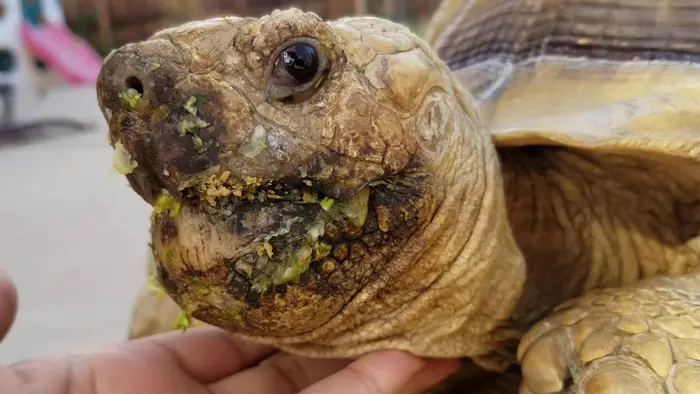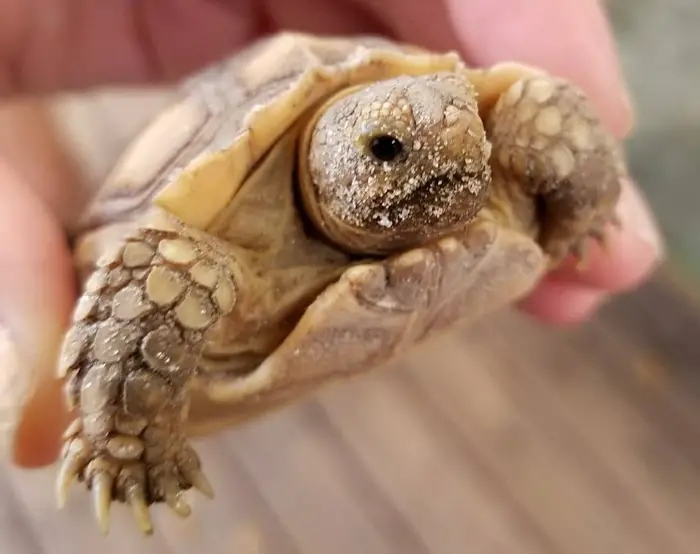Tortoise Mouth Rot: Causes, Symptoms, Prevention, Treatment
Like other reptiles, tortoises rely on their broad innate immune system to defend themselves against infections. However, their immune system can become compromised, making them more vulnerable to diseases like mouth rot.
But what is tortoise mouth rot? Also referred to as stomatitis, mouth rot in tortoises is an infection in the mouth with many causes and symptoms. The condition is treatable and is usually accompanied by ulcers, swelling, and redness in the oral cavity.
So then, how do you treat mouth rot, and is the disease preventable? To know everything in detail, continue reading to find out about such infections in tortoises.
What Are The Causes of Tortoise Mouth Rot?
Contents

Mouth rot in tortoises is a severe but treatable condition caused by many things. The causes include:
1. Bacterial Or Viral Infections
When bacteria in the tortoise’s mouth gets into an open wound, it can cause infection in the mouth and gum’s lining. The most common opportunistic bacteria that cause mouth rot include Pseudomonas and Aeromonas. Viruses, on the other hand, only complicate the severity of the infection.
2. Mouth Injury or Trauma
Sometimes, your pet tortoise may sustain mouth injuries from fighting with other tortoises, chewing on sharp objects, or rough handling. If these injuries are not treated in time, bacteria can enter through the openings, causing reptile stomatitis.
3. Poor Husbandry
Husbandry factors are another common cause of most health issues affecting tortoises, including mouth rot. Generally, a tortoise living in unsanitary conditions with improper humidity or temperature levels is likely to develop this condition.
This is because the living conditions can stress it and weaken its immune system, creating an enabling environment for bacterial infections.

4. Improper Diet
Like all animals, tortoises also need a balanced diet to stay healthy. Their diet should be high in fiber, low in sugars, and have the correct balance of essential minerals. If not, they can develop a weak immune system, making them more susceptible to infections like stomatitis.
5. Improper Jaw Alignment
Your pet’s jaws may become misaligned from physical trauma or poor trimming of beaks. As a result, food could gather in one part of the mouth, thereby attracting bacteria. Also, the overused side of your pet’s mouth can become sore and develop infections.
Symptoms of Mouth Rot In Tortoises

If you suspect your tortoise could be having mouth rot, below are the typical symptoms to watch out for.
1. Inflammation and Ulceration
The mouth and surrounding tissues, including the gums, may appear inflamed and red. Occasionally, the inflammation can be accompanied by minor oral ulcers or sores, which can spread rapidly.
2. Loss of Appetite
When the mouth and gum lining have inflammation, your pet tortoise will have trouble eating. Therefore, it can show reduced appetite or refuse to eat completely.
3. Unusual Discharge
Another mouth rot symptom in tortoises is white cheesy discharge from the mouth, especially with severe infection. The exude can sometimes appear yellow. In addition, your pet can have a runny nose or excessive drooling due to mouth irritation.
4. Lethargy
If your tortoise does not eat or eats little, it can become lethargic. This happens due to reduced energy levels, leading to minimal activity levels.
5. Stressed Behavior
Mouth rot is a painful condition for tortoises. Therefore, it can cause discomfort and stressed behavior in these pets. When stressed, the tortoise can be aggressive towards its mates and spend more time hiding.
Best Practices To Prevent Mouth Rot

While mouth rot is a common condition in tortoises, there are several things you can do to prevent it. These include:
1. Keeping the Tortoise in a Clean Enclosure
A dirty enclosure promotes bacterial growth. However, this can be avoided by regularly cleaning and disinfecting your pet’s pen and removing waste or food scraps. You also must change the bedding at least every month. When cleaning the cage, ensure there is nothing that could injure the animal.
2. Proper Nutrition
Poor nutrition can weaken your tortoise’s immunity. So, you must ensure your pet has access to a healthy diet of fresh, leafy greens, fruits, and vegetables. You can also give your tortoise multivitamins rich in minerals like calcium, zinc, magnesium, copper, and selenium to strengthen their immunity.
3. Maintaining a Suitable Environment
When the humidity and temperature are too high or too low, this can contribute to stomatitis.
Generally, the recommended temperature levels at daytime range between 72 and 80 degrees Fahrenheit on the cool side. And 90 to 95 degrees Fahrenheit on the warm side.
As for the humidity levels, you should maintain between 60% and 80% to prevent infections. These levels vary from one species to another.
4. Stress Avoidance
You need to provide your tortoise with a peaceful environment for stress avoidance. This is because too much stress can affect its overall health. Generally, a peaceful environment should be free from excessive noise and the sight of dogs or cats. Also, you must reduce the handling of the animal.
5. Regular Health Checkups
With regular checkups, the vet can detect signs of illnesses that could contribute to mouth rot and treat them immediately.
What Is The Treatment for Mouth Rot?

The correct treatment for mouth rot largely depends on the particular cause of the condition. Typically, treatment options include:
Oral Antiseptic Solutions and Creams
If the condition is detected early, cleaning the mouth rot with an antiseptic mouthwash can prevent it from spreading.
Examples of antiseptic solutions commonly used include 1% povidone-iodine or Betadine and 0.25 to 0.5% chlorhexidine diacetate or Nolvasan. The vet can also administer antiseptic cream for faster healing.
Use of Antibiotics
When the cause of the mouth rot is bacteria, the vet will prescribe antibiotics such as Ampicillin. The antibiotics can be injected directly, administered orally, or applied topically to the mouth. But before administering the medicine, the vet usually removes existing plaques and pus around the gum.
Surgery
In severe cases, the vet can recommend an invasive surgery to remove the infected tissues. This is usually accompanied by fluid therapy to expedite recovery.
Anyway, I got a video for you. Hope it’ll help you to have more understanding about such infections.
FAQs
Here, we will respond to commonly asked queries about mouth rot in tortoises.
Like with most tortoise health problems, mouth rot cannot heal on its own. This is because it is a serious bacterial infection that spreads easily without prompt veterinary treatment.
If not treated early on, mouth rot infection could eventually spread into the rest of the digestive tract. And in severe cases, the infection may reach the lungs, leading to pneumonia.
Apart from examining your pet’s mouth, a vet can diagnose the condition through lab testing. The testing involves examining the cells obtained in the tortoise’s oral cavity under a microscope.
Outro
Generally, mouth rot is more common in pet tortoises than in wild ones. The causes of this condition vary from one tortoise to another. Regardless of the causes, the symptoms are the same depending on the severity of the disease.
With that said, there are several treatment options available. However, it is advisable to seek treatment from a professional reptile vet. Once your tortoise makes a full recovery, there are various practices you can implement to ensure the illness does not reoccur.


